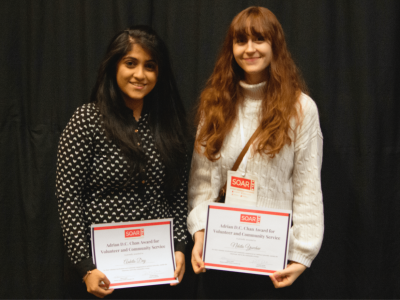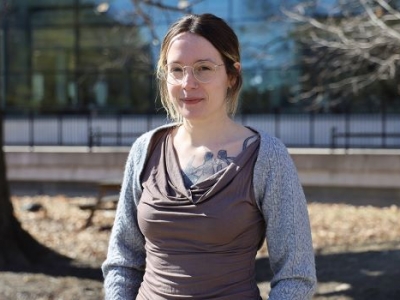The following story, written by Kirsten Fenn, appeared in the November issue of Carleton Now.

Ask most students how they manage to balance the responsibilities of work, life and school, and they’ll probably tell you it comes with its challenges. As the first part-time graduates of the Master of Philanthropy and Nonprofit Leadership (MPNL) know, it’s also allowed them to grow as professionals.“It takes a lot of discipline and organization, and I think many of us in the MPNL program have faced those challenges,” says Zahra Stark, who graduated from the program this fall. While completing her degree, Stark balanced a role as the director of a small arts organization in British Columbia and completed a practicum at Artscape in Toronto.
The knowledge she gained from the program about fundraising, budgeting and research helped her land her current job as campaign manager for a fundraising firm in the United Kingdom, where she organizes telephone fundraising campaigns for universities.
“My degree was very instrumental in that,” Stark says. “We use a lot of the principles we learned in the program.”
For other MPNL graduates, like Heather Norris, it’s not only the skills and theory from the program that have been applicable to a career in the non-profit sector. Her practicum placement at Northumberland United Way in Cobourg, Ont., led to the creation of a new position at the organization – director of community impact – which she now holds.
In the new role, Norris measures the impact of the group’s services on individuals in the community, something she started as a research project during her practicum there.
“It’s really exciting because this role really aligns with key learnings from the MPNL program,” Norris says. “For example, learning about impact in terms of evaluation measurement, governance, leadership and organizational development.”
With two weeks of on-campus classes over the course of two summers and the rest completed online, the program also allows students to complete the degree remotely, making it “exceptionally designed to accommodate working professionals,” Norris says.
It was important for her to stay at home and usual these kind of course are inaccessible in small communities like hers.
For Jenny Sung, who worked on a capstone project about social enterprises with Stark and their fellow MPNL graduate Jennifer Sault, the ability to complete the program remotely was a deciding factor in choosing the degree. It allowed her to stay home in Vancouver and keep her job at a think-tank called the Asia Pacific Foundation of Canada.
But it also meant completing her capstone project virtually. Sung, Stark and Sault worked on their project from three different time zones, with Sung in Vancouver, Stark in Hamilton, Ont., and Sault in Dubai.
Despite challenges, it helped the team improve their communication, planning and organizational skills.
“We somehow got into the rhythm of working in turn,” says Sault, who works in Dubai with a social enterprise that funds projects in Mozambique. “For example, Jenny would write the bulk of her emails before sleeping and I would start in with an inbox full of her and Zahra’s work to add to when I woke up.”
Most of all, the women agree that one of the most valuable lessons from the program was the opportunity to work with colleagues who have an array of real-world experience in the non-profit field.
“I accrued so much knowledge that I never would have got the opportunity to learn outside of developing it in a professional context,” Stark says.
For more information about the Philanthropy and Nonprofit Leadership program, watch this video:
Monday, November 16, 2015 in Convocation, News, Programs
Share: Twitter, Facebook




